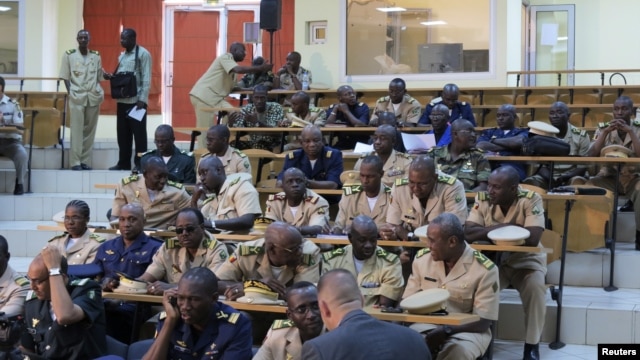Rentahamster
Rodent Whores
VIDEO of Clinton and Algerian president: http://www.guardian.co.uk/world/video/2012/oct/30/hillary-clinton-algeria-president-mali-video
http://www.npr.org/templates/story/story.php?storyId=163854900
Active involvement is still not explicitly something the US wants to do.
The rebels are prepared to strike back if provoked.
http://www.guardian.co.uk/world/2012/oct/29/mali-africa
Drone strikes come up again:

SUPPLEMENTAL INFO:
Washington Post
Voice of America

2012 Presidential debate mentions of "Mali":
http://www.washingtonpost.com/polit...8899d6-1c7a-11e2-9cd5-b55c38388962_print.html
Analysis:
TIME: What Malis Crisis Means for the Future of Western Military Intervention
Bloomberg: The Case for Mali Coddling
Two important things to note: Actions have consequences.
1. The defeat of Qaddafi by the US led international force resulted in a flood of weapons and mercs into Mali.
http://www.time.com/time/world/article/0,8599,2109810,00.html
http://www.washingtonpost.com/world...rained-in-us/2012/03/23/gIQAS7Q6WS_story.html
http://www.npr.org/templates/story/story.php?storyId=163854900
ALGEIRS, Algeria (AP) U.S. Secretary of State Hillary Rodham Clinton sought Algeria's assistance on Monday for any future military intervention in Mali, pressing the North African nation to provide intelligence if not boots on the ground to help rout the al-Qaida-linked militants across its southern border.
...
When Mali's democratically elected leader was ousted in a military coup in March, Tuareg rebels seized on the power vacuum and within weeks took control of the north, aided by an Islamist faction. The Islamists then quickly ousted the Tuaregs and took control of half the country.
The U.N. Security Council has unanimously approved the idea of an African-led military force to help the Malian army oust Islamic militants, but its details are still unclear.
Washington is keen to eliminate northern Mali as a haven for al-Qaida in the Islamic Maghreb, which may have been involved in September's attack on the U.S. Consulate in the Libyan city of Benghazi. Mali even came up in the U.S. election campaign, with Republican challenger Mitt Romney citing the African nation's instability in a foreign policy debate with President Barack Obama.
Active involvement is still not explicitly something the US wants to do.
While the U.S. wants to see the rebels routed, it has no interest in active involvement in the military mission, unless Mali and West African states explicitly ask for such assistance, a senior American diplomat in Africa said. The official demanded anonymity because he wasn't authorized to speak publicly on the matter.
The rebels are prepared to strike back if provoked.
http://www.guardian.co.uk/world/2012/oct/29/mali-africa
Islamist rebels vow assault on Malian capital if international forces attack
Movement for Tawhid and Jihad in West Africa claims rebels are strengthening and foreign intervention would galvanise support
Movement for Tawhid and Jihad in West Africa claims rebels are strengthening and foreign intervention would galvanise support
Islamist rebels will attack Mali's capital city if international military intervention is launched to regain control of the country's north, a senior member of an insurgent group closely linked to al-Qaida has told the Guardian .
Oumar Ould Hamaha, head of security for the Movement for Tawhid and Jihad in West Africa (Mujao) claimed that rebels have recruited thousands of new fighters and warned that intervention would galvanise the international jihadist movement.
"If an international or Malian military force attacks us, we will take Bamako in 24 hours," Hamaha said in a telephone interview. "The international community is slow to strike because it knows that if it does, it will spark a worldwide jihad.
"Plans for a military intervention do not diminish in any way our determination to promote jihad," Hamaha added. "We are convinced that with the help of Allah we will defeat any army coming. We have the support of the local people, and we have people from all parts of Africa coming to join us. We are ready to die.
Drone strikes come up again:
Previous Neogaf thread related to drone strikes: http://www.neogaf.com/forum/showthread.php?t=497287
The role of the US in combatting AQIM in northern Mali has been a source of controversy in recent weeks. Hamaha told the Guardian the Mujao was aware that US surveillance drones were operating regularly in the region already, and that the unmanned aircraft were having the effect of encouraging support for the Islamist cause in northern Mali.
"We see drones passing overhead all the time. This is not something we take seriously we are not afraid of drones. On the contrary, by trying to intimidate us, the west is only sharpening the sword we will use against it."

SUPPLEMENTAL INFO:
Washington Post
U.S. pushes Algeria to support military intervention in Mali
U.S. looks to effort in Somalia as model for Mali solution
White House secret meetings examine al-Qaeda threat in North Africa
U.S. looks to effort in Somalia as model for Mali solution
White House secret meetings examine al-Qaeda threat in North Africa
Voice of America
DAKAR October 30, 2012
International officials are finalizing plans for deploying troops and sending military support to Mali to help it retake the north of the country from al-Qaida-linked militants who seized control in April.
Representatives from the United Nations, African Union, Economic Community of West African States (ECOWAS), European Union and other partner countries are meeting Tuesday and Wednesday in Bamako to finalize operational plans for the African-led military intervention.
After months of wrangling over details, international powers and Malian authorities appear to be reaching the same page.

2012 Presidential debate mentions of "Mali":
http://www.washingtonpost.com/polit...8899d6-1c7a-11e2-9cd5-b55c38388962_print.html
ROMNEY: Mali has been taken over, the northern part of Mali by al-Qaeda type individuals. We have in -- in Egypt, a Muslim Brotherhood president. And so what were seeing is a pretty dramatic reversal in the kind of hopes we had for that region. Of course the greatest threat of all is Iran, four years closer to a nuclear weapon. And -- and were going to have to recognize that we have to do as the president has done. I congratulate him on -- on taking out Osama bin Laden and going after the leadership in al-Qaeda.
But we cant kill our way out of this mess. Were going to have to put in place a very comprehensive and robust strategy to help the -- the world of Islam and other parts of the world, reject this radical violent extremism, which is -- its certainly not on the run.
ROMNEY: Its wonderful that Libya seems to be making some progress, despite this terrible tragedy.
But next door, of course, we have Egypt. Libyas 6 million population; Egypt, 80 million population. We want -- we want to make sure that were seeing progress throughout the Middle East. With Mali now having North Mali taken over by Al Qaida; with Syria having Assad continuing to -- to kill, to murder his own people, this is a region in tumult.
And, of course, Iran on the path to a nuclear weapon, weve got real (inaudible).
Analysis:
TIME: What Malis Crisis Means for the Future of Western Military Intervention
Bloomberg: The Case for Mali Coddling
Two important things to note: Actions have consequences.
1. The defeat of Qaddafi by the US led international force resulted in a flood of weapons and mercs into Mali.
http://www.time.com/time/world/article/0,8599,2109810,00.html
Mali: Big Trouble in a Poor Country Awash in Post-Gaddafi Weapons Mar. 22, 2012
To the clatter of gunfire and under the cover of darkness, the President who ushered Mali into an unprecedented era of multiparty democracy fled the West African country's sleepy capital, Bamako, last night as an army mutiny rapidly escalated into a full-blown coup attempt. The renegade soldiers had claimed to have seized the country after storming the presidential palace during the night. But President Amadou Toumani Toure's reappearance at a nearby military cantonment, apparently at the head of a crack bodyguard of red-beret paratroopers, now leaves Mali on the brink of a civil war apart from dealing with the thorny Tuareg rebellion that helped precipitate the military uprising. In less than 24 hours, one of Africa's most stable democracies has turned upside down.
Although Toure's stewardship of Mali has seen the country blossom into a beacon of democracy on a continent that knows precious little of it, entrenched poverty and the 63-year-old former paratrooper's perceived mishandling of a powerful insurgency led by ethnic Tuareg separatists in northern Mali have fomented a powerful sense of discontent in recent months, especially within the military. The Tuareg rebels have heaped humiliation after humiliation on government troops using a lightning brand of desert warfare that has seen them strike at multiple targets separated by hundreds of miles of desert and desolate scrubland. Highly motivated and equipped with box-fresh weaponry looted from the arsenals of Libya's late Colonel Muammar Gaddafi including vehicle-mounted rocket launchers, antiaircraft guns and surface-to-air missiles the Tuareg fighters have easily outmatched Mali's demoralized soldiers, who have had to rely on limited quantities of World War II matériel.
2. The leader of the Mali coup had US military training (how much is not so clear).After Wednesday's violence, the first confirmation that a coup was indeed under way came in the small hours of Thursday when the leaders of the uprising appeared on state television, announcing their intention to depose Toure. Styling themselves the National Committee for the Return of Democracy and the Restoration of the State, they denounced the President's incompetence and promised to "hand power back to a democratically elected President as soon as the country is reunified and its integrity is no longer threatened [ -hamster note: We all see how that turned out... :/ ]," according to Lieutenant Amadou Konare, the group's spokesman. The TV appearance also provided the first glimpse of the leader of the coup, a little-known officer named Captain Amadou Sanogo, who is thought to be an instructor at Mali's main military garrison.
http://www.washingtonpost.com/world...rained-in-us/2012/03/23/gIQAS7Q6WS_story.html
Leader of Mali military coup trained in U.S. March 23, 2012
The leader of a military coup in the West African country of Mali received military training in the United States on several occasions, a U.S. defense official said Friday.
Capt. Amadou Haya Sanogo, who led a renegade military faction that on Thursday deposed Malis democratically elected president, visited the United States several times to receive professional military education, including basic officer training, said Patrick Barnes, a U.S. Africa Command official based in Washington.
Barnes said he could not immediately provide further details about the duration or nature of Sanogos participation in the International Military Education and Training program. The State Department funds that program, and foreign officers are generally selected by U.S. Embassy officials.

